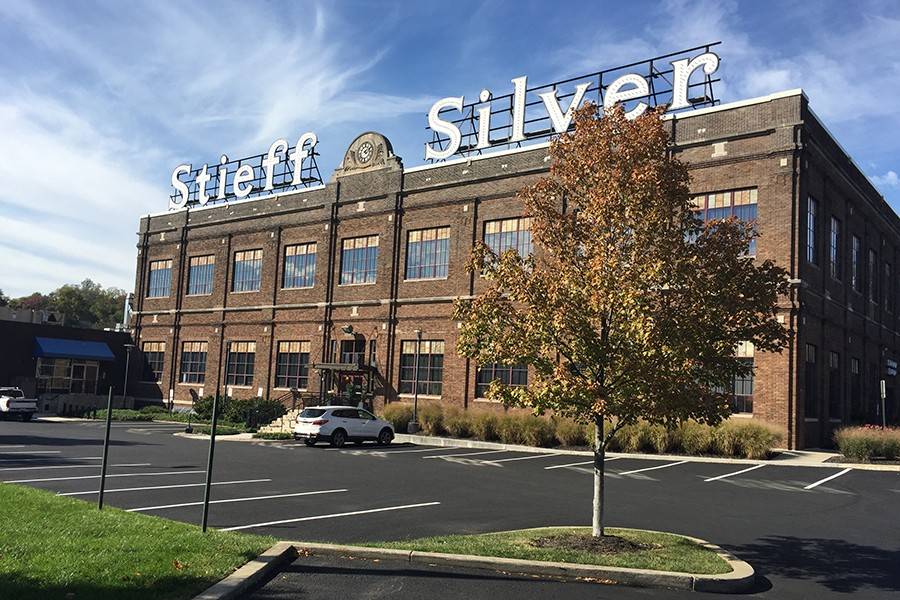A length of rope fashioned into a noose was found in a Johns Hopkins University–owned off-campus building on Thursday, a "heinous symbol of hate" and a possible hate crime that university leaders swiftly and strongly condemned on Friday.
The noose was discovered by a nonaffiliate at a construction site in the Stieff Silver building, a research facility located in Baltimore's Remington neighborhood, where renovations of a Whiting School of Engineering laboratory are taking place.
The university has referred the matter to federal law enforcement and has also launched its own investigation, led by the Office of Institutional Equity.
"Johns Hopkins University unequivocally and in the strongest possible terms condemns this act of hate," JHU President Ronald J. Daniels wrote in a message Friday to the university community. "We find such racist imagery horrifying and repugnant and a direct threat to the Black community at Johns Hopkins and in Baltimore. Such an act stands in stark opposition to the values of equity, justice, and humanity to which we are firmly committed."
University officials are coordinating their actions with the general contractor, Baltimore-based Plano-Coudon, which has offered its full cooperation and support. The job site has been shut down until further notice.
"We take this matter extremely seriously," said Daniel Ennis, Johns Hopkins University's senior vice president for administration and finance. "We will do everything within our power to make sure our community is free from hate and intimidation. Acts like this have no place in our society."
Anyone with information about this incident is encouraged to contact Campus Safety and Security at 410-516-4600.
The incident comes at a time of pronounced national reckoning with issues of bigotry and racial injustice, in the wake of nationwide protests against racism and police brutality sparked by the death of George Floyd in Minneapolis.
The noose, a deliberate symbol of racial hatred and intimidation, evokes the nation's violent and shameful history of thousands of lynchings perpetrated against Black Americans since its founding. Two weeks ago, a noose found at an Alabama racetrack in the garage of NASCAR driver Bubba Wallace—the top racing circuit's only Black competitor and a vocal supporter of the Black Lives Matter movement—sparked widespread condemnation and prompted a federal investigation.
"We know that incidents like this—wherever they happen—can cause or reinforce trauma for members of our community, especially our Black and Brown colleagues, students, and faculty," said Katrina Caldwell, JHU's vice provost for diversity and inclusion and chief diversity officer. "That this has happened at a moment when there has been such pain over racially motivated violence means we must lean in and offer the support our community needs now and that we must become better, more informed allies in the urgent work that needs to be done to fight against racism in all its forms."
The complete message from President Daniels is below:
Dear Johns Hopkins Community:
I am anguished to be writing you with some very distressing news.
Yesterday, a rope tied into a noose was found in a construction site of a Whiting School of Engineering lab in an off-campus facility, the Stieff Silver building near the Homewood campus. We have referred the incident to federal law enforcement as a potential hate crime, and we are conducting our own investigation as well, led by the Office of Institutional Equity.
The noose stands as a deliberate symbol of the murderous terror of thousands of lynchings perpetrated against Black people in America since the beginning of this nation. It is a singular and terrifying image that through to the present traumatizes and dehumanizes millions of Black people.
Johns Hopkins University unequivocally and in the strongest possible terms condemns this act of hate. We find such racist imagery horrifying and repugnant and a direct threat to the Black community at Johns Hopkins and in Baltimore. Such an act stands in stark opposition to the values of equity, justice, and humanity to which we are firmly committed.
In recent weeks, we have been working with a number of our faculty, staff, and students to develop ways to deepen our own work against racism and in support of racial equity and inclusion, and we will communicate our next steps early next week.
At this watershed moment in America, the words of Bryan Stevenson, founder and executive director of the Equal Justice Initiative and our 2018 Commencement speaker, resonate powerfully: "We cannot heal the deep wounds inflicted during the era of racial terrorism until we tell the truth about it. … Only then can we meaningfully address the contemporary problems that are lynching's legacy."
That is the charge we must take up in earnest, collectively and individually, in the days and months ahead.
We know that many will feel the pain and impact of an incident like this profoundly. The university is offering resources for support and healing, through MySupport for faculty and staff and for students through wellness.jhu.edu and its dedicated resources on racial trauma.
Thank you for your continued support and concern for one another now and always.
Sincerely,
Ronald J. Daniels
Posted in University News








